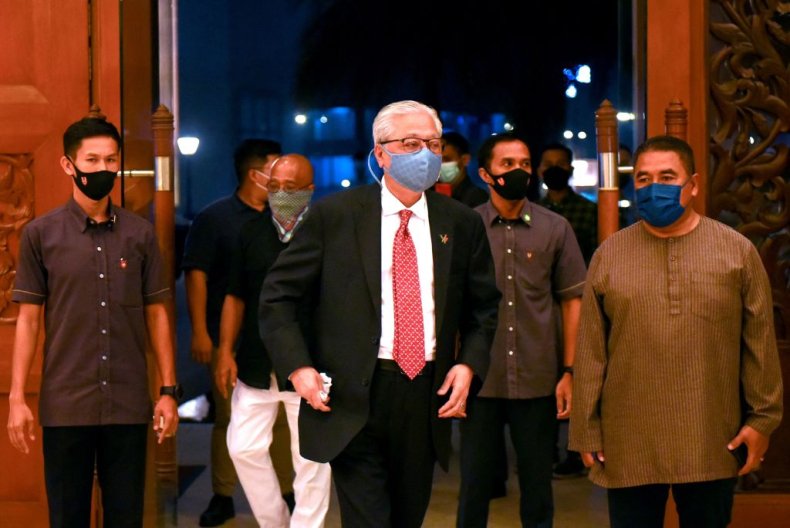Malaysia's prime minister criticized and raised concerns over Australia's new deal with the United States to attain nuclear-powered submarines.
Prime Minister Ismail Sabri Yaakob warned that the deal between the U.S. and Australia could lead to a nuclear arms race in the region, Malaysia's Daily Express newspaper first reported. The Malaysian leader raised his concerns directly with Australia's Prime Minister Scott Morrison in a Friday phone call, according a statement from Yaakob's office.
"At the same time, it will provoke other powers to take more aggressive action in this region, especially in the South China Sea," the Malaysian leader warned in a Saturday statement. He also asserted that Malaysia would continue to ensure its regional waters are a "Zone of Peace, Freedom and Neutrality"—as declared under a 1971 agreement with Indonesia, the Philippines, Singapore and Thailand.

A State Department spokesperson pushed back against Malaysia's assessment of the new agreement with Australia.
"A free and open Indo-Pacific region is critical to the security and prosperity of the American people and for our allies and partners. This partnership will help defend our shared interests there for generations," the spokesperson told Newsweek.
"This enhanced security partnership is especially important given the changing strategic environment in the region. It demonstrates U.S. commitment to revitalizing our alliances and strengthening them to take on the challenges of the 21st century."
The plan with Australia has drawn substantial criticism from several nations. China—the regional superpower—condemned the decision as "extremely irresponsible." Chinese foreign ministry spokesman Zhao Lijian said during a press briefing that it "seriously undermines regional peace and stability and intensifies the arms race."
China claims most of the South China Sea as its own despite conflicting claims with regional nations—including Malaysia—and an international tribunal ruling against its claim in 2016.
France—a key ally of the U.S. and Australia—was outraged by the decision, as Australia canceled a previous deal for diesel submarines with the European nation in favor of the nuclear-powered submarines, which are stealthier and more durable, among other advantages.
"This brutal, unilateral and unpredictable decision reminds me a lot of what Mr. Trump used to do," French Foreign Minister Jean-Yves Le Drian told Franceinfo radio on Thursday. "I am angry and bitter. This isn't done between allies."
The European nation then recalled its ambassadors from the U.S. and Australia on Friday.
"At the request of the President of the Republic, I have decided to immediately recall our two ambassadors to the United States and Australia to Paris for consultations," the French foreign minister said in a statement. "This exceptional decision is justified by the exceptional gravity of the announcements made on 15 September by Australia and the United States."
State Department spokesperson Ned Price responded to France's anger by calling the European nation a "vital partner."
"We have been in close contact with our French allies. We understand their position, and we are aware of their plans to recall Ambassador Etienne to Paris for consultations. France is a vital partner & our oldest ally, and we place the highest value on our relationship," Price wrote in a Twitter post.
[1 of 3]: We have been in close contact with our French allies. We understand their position, and we are aware of their plans to recall Ambassador Etienne to Paris for consultations. France is a vital partner & our oldest ally, and we place the highest value on our relationship. pic.twitter.com/xLci8Y8V6V
— Ned Price (@StateDeptSpox) September 18, 2021
Meanwhile, Singapore spoke favorably of the new Australia-U.S. deal. The island nation's Ministry of Foreign Affairs said Prime Minister Lee Hsien Loong spoke to Morrison by phone this week. Lee told the Australian leader he hopes the deal will "contribute constructively to the peace and stability of the region and complement the regional architecture," according to the ministry.
This article has been updated with a statement from a State Department spokesperson.
"follow" - Google News
September 19, 2021 at 12:48AM
https://ift.tt/3kkvGjW
South China Sea Nuclear Escalation Could Follow U.S.-Australia Submarine Deal: Malaysia - Newsweek
"follow" - Google News
https://ift.tt/35pbZ1k
https://ift.tt/35rGyU8
Bagikan Berita Ini














0 Response to "South China Sea Nuclear Escalation Could Follow U.S.-Australia Submarine Deal: Malaysia - Newsweek"
Post a Comment